Irritable Bowel Syndrome isn’t just a stomach upset. For millions of people, it’s a daily battle with pain, bloating, and unpredictable bowel changes that disrupt work, sleep, and social life. Unlike infections or ulcers, IBS doesn’t show up on scans or blood tests. That’s why so many people wait years for a diagnosis - and why so many end up feeling dismissed. But the truth is, IBS is real, common, and manageable. It affects about 1 in 7 people worldwide, with women making up most of those diagnosed. If you’ve been told it’s "just stress" or "all in your head," you’re not alone. But there’s a better way forward.
What IBS Actually Feels Like
IBS isn’t one thing. It’s a group of symptoms that come and go, often without warning. The core sign is recurring abdominal pain - usually crampy, sometimes sharp - that gets worse after eating and improves after a bowel movement. That’s the pattern doctors look for. But it doesn’t stop there.
Most people with IBS also deal with bloating so bad their clothes feel tight. Some have diarrhea - sudden, urgent, watery stools that can ruin a day. Others struggle with constipation: straining, feeling incomplete, passing hard pellets. About a quarter of people switch between both. You might notice mucus in your stool or feel like you’re gassing up constantly. These aren’t minor annoyances. They’re the daily reality for people living with IBS.
And it’s not just the gut. Around 70% of people with IBS report other issues: a lump in the throat that won’t go away, nausea after meals, chest pain that feels like a heart issue, or even frequent belching. These aren’t random. They’re part of how the gut and brain talk - or miscommunicate - in IBS.
How Doctors Diagnose IBS
There’s no single test for IBS. Instead, doctors use a checklist called the Rome IV criteria. To be diagnosed, you need to have had abdominal pain at least once a week for the last three months, with symptoms starting at least six months before. The pain must also change with bowel movements or be linked to a change in stool frequency or form.
But before giving that label, your doctor has to rule out other things. That’s why blood tests, stool tests, and sometimes a colonoscopy are part of the process. Red flags that need checking include: unexplained weight loss, rectal bleeding, anemia, symptoms starting after age 50, or a family history of colon cancer or Crohn’s disease. If you have any of these, you need more testing - fast.
For most people, though, diagnosis is about matching symptoms. If your pain fits the pattern, tests come back normal, and no red flags show up, then IBS is the most likely answer. It’s not a diagnosis of exclusion - it’s a diagnosis of recognition.
What Makes IBS Symptoms Worse
IBS flares don’t come out of nowhere. They’re usually triggered by something. And the biggest triggers? Food, stress, and hormones.
High-FODMAP foods are the top dietary culprit. That’s a fancy term for certain carbs that ferment in the gut - things like onions, garlic, wheat, dairy, apples, and artificial sweeteners. About 70% of people with IBS see major improvement when they cut these out. The low-FODMAP diet isn’t a forever restriction - it’s a tool. You eliminate, then slowly add foods back to find your personal triggers.
Stress doesn’t cause IBS, but it turns up the volume. When you’re anxious or overwhelmed, your gut reacts. Many people notice their symptoms spike before exams, during job stress, or after emotional events. That’s because your gut has its own nervous system - and it’s wired straight to your brain.
For women, hormones play a big role. Around 60-70% report worse symptoms right before or during their period. Estrogen and progesterone levels affect gut motility and sensitivity. That’s why IBS often starts in the teens or 20s - right when hormone shifts begin.
Antibiotics can also trigger IBS in about a quarter of people. They wipe out good gut bacteria, which can throw the whole system off balance. Even one course can set off symptoms that last months.
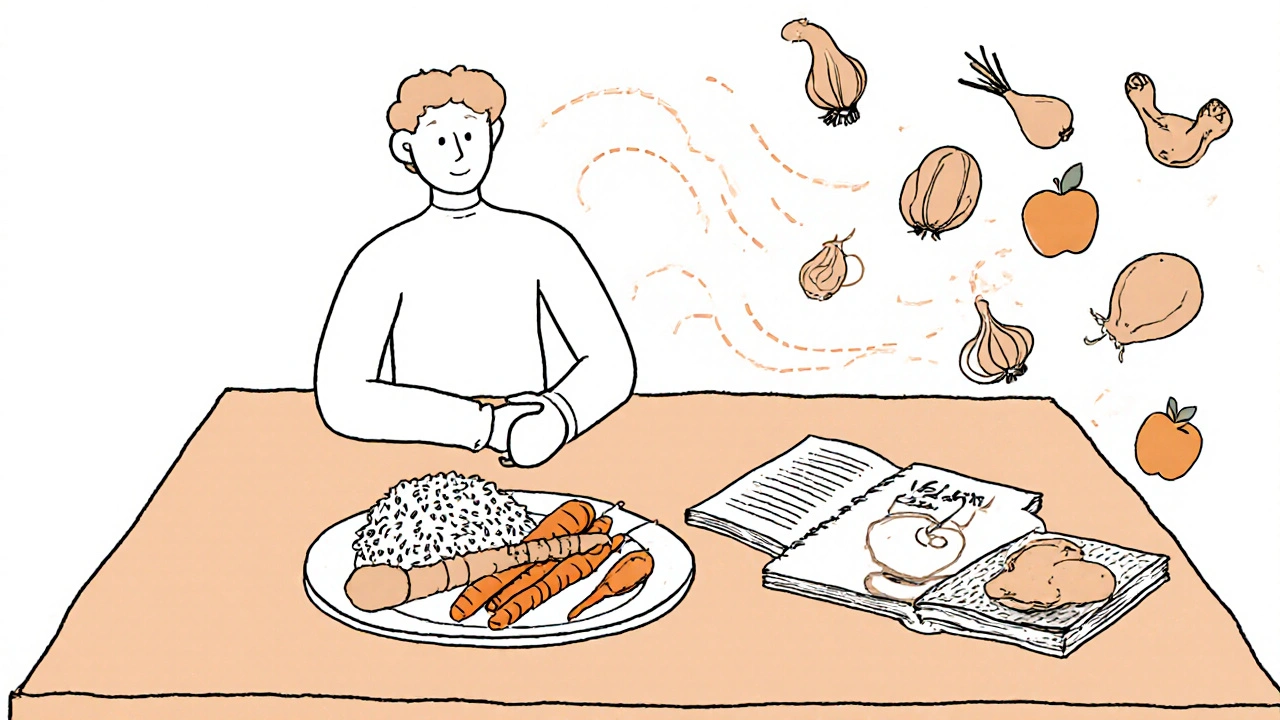
Medications That Actually Help
There’s no one-size-fits-all pill for IBS. Treatment depends on your subtype: diarrhea-predominant (IBS-D), constipation-predominant (IBS-C), or mixed (IBS-M).
For IBS-D, the FDA has approved two drugs: rifaximin (Xifaxan) and eluxadoline (Viberzi). Rifaximin targets gut bacteria and helps about half of users. Eluxadoline slows down the gut and reduces pain and diarrhea - but it can cause constipation or pancreatitis in rare cases. Over-the-counter loperamide (Imodium) helps with diarrhea but doesn’t fix the root issue.
For IBS-C, the go-to options are linaclotide (Linzess) and plecanatide (Trulance). These drugs draw water into the intestines, making stools softer and easier to pass. About 30-40% of people get at least three normal bowel movements a week. Lubiprostone (Amitiza) is another option, but it’s less effective for many.
For pain and cramping, antispasmodics like dicyclomine (Bentyl) or hyoscyamine (Levsin) work for about 55% of people. They relax gut muscles, easing cramps. But they can cause dry mouth or dizziness.
Then there’s the surprising winner: low-dose antidepressants. Not because you’re depressed - but because they calm the gut-brain connection. Amitriptyline at 10-30 mg nightly helps 40-50% of people with overall symptoms, even if they don’t have depression. It’s not a mood drug here. It’s a nerve-calming tool.
What Works Beyond Pills
Medication isn’t the only answer. In fact, many people find better relief with non-drug approaches.
The low-FODMAP diet, done right with a dietitian, helps 50-75% of people. It’s not about cutting out everything forever. It’s about finding your triggers. Most people identify 2-3 foods that set them off - and then they can enjoy the rest.
Therapy works, too. Gut-directed hypnotherapy and cognitive behavioral therapy (CBT) have been shown to be as effective as medication. In trials, 40-60% of people saw major improvement. These therapies help retrain how the brain responds to gut signals, reducing pain and anxiety together.
Probiotics? Only one strain has solid proof: Bifidobacterium infantis 35624. It helped 35% of users in trials - better than placebo, but not a miracle. Most other probiotics on the shelf? No clear benefit.
And stress management? Non-negotiable. Daily walks, breathing exercises, yoga, or even just 10 minutes of quiet time can lower symptom severity. Your gut doesn’t care if you’re stressed about your boss or your bills - it just reacts.
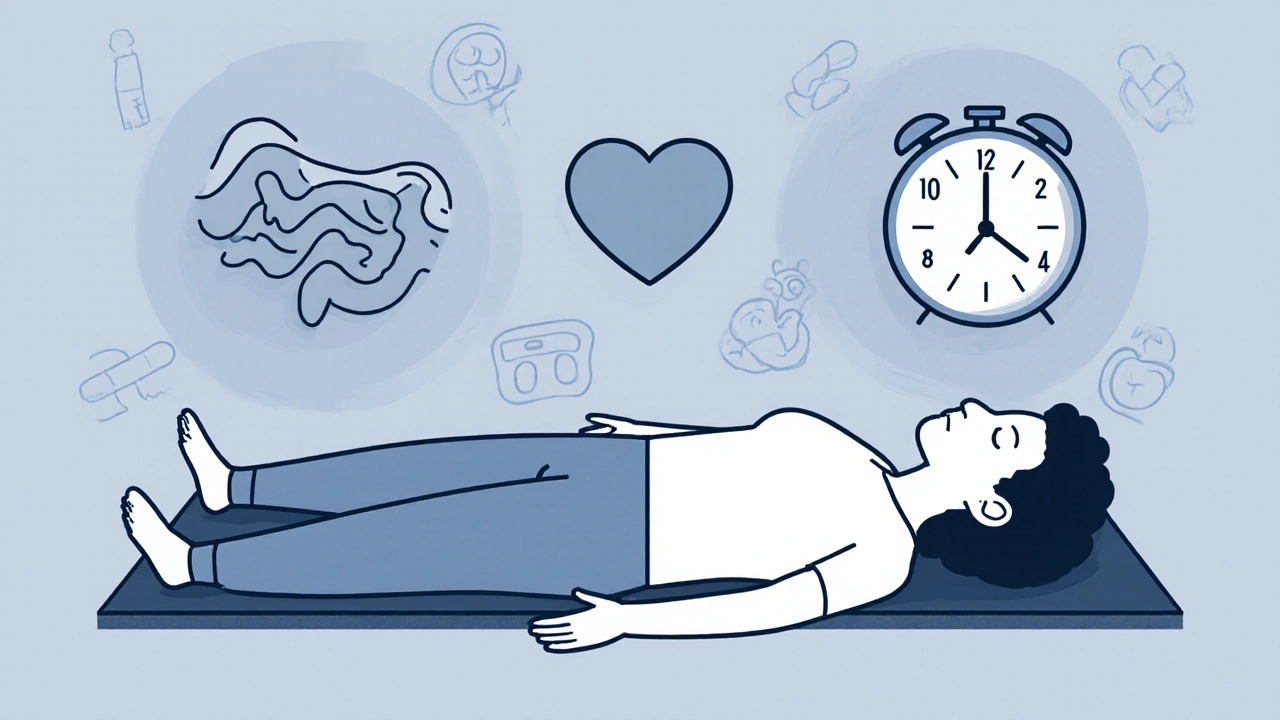
What to Expect in the Long Run
IBS is chronic, but it’s not progressive. It won’t turn into Crohn’s or cancer. Symptoms can come and go for years, but many people find long-term control. Studies show that with the right mix of diet, stress tools, and medication, 60-70% of people see major improvement within six months.
It takes time. Diagnosis alone can take 2-3 visits over a couple of months. The low-FODMAP diet takes 12-18 weeks to complete. Medications often need 4-8 weeks to show full effect. Patience is part of the treatment.
And you’re not alone. A 2022 survey of over 1,200 IBS patients found that 68% missed work or school because of symptoms. But 62% said dietary changes helped, and 55% felt much better after finding the right treatment plan. That’s not a small number - that’s a majority who found relief.
The future is looking brighter, too. New drugs like ibodutant are in late-stage trials. Fecal microbiota transplants (FMT) are being tested, with some studies showing 35% of patients go into remission. But right now, the best tool is still the same: know your triggers, work with your doctor, and don’t settle for "just living with it." You can feel better.
What to Do Next
If you think you have IBS, start by tracking your symptoms. Write down what you eat, when you feel pain, how stressed you are, and what your bowel movements look like. Bring this to your doctor. Don’t let them brush you off. Ask about the Rome IV criteria. Ask if you need tests to rule out celiac disease or IBD.
Ask for a referral to a dietitian who knows the low-FODMAP diet. Don’t try it alone - it’s easy to mess up. Ask about therapy options - hypnotherapy or CBT - even if you think stress isn’t the main problem.
And if medication is suggested, ask why. What’s the goal? What are the side effects? How long until you’ll know if it’s working? You have the right to understand your treatment.
IBS doesn’t define you. But how you manage it? That does.
Can IBS turn into colon cancer?
No, IBS does not increase your risk of colon cancer or other serious bowel diseases. It’s a functional disorder - meaning the gut doesn’t work right, but there’s no damage or growths. However, some symptoms of IBS can overlap with signs of colon cancer, like changes in bowel habits or abdominal pain. That’s why doctors check for red flags like unexplained weight loss, rectal bleeding, or symptoms starting after age 50. If those are present, further testing is needed - not because IBS turns into cancer, but because cancer can hide behind similar symptoms.
Is the low-FODMAP diet hard to follow?
Yes, it can be. The strict elimination phase removes many common foods - bread, onions, garlic, dairy, apples, and artificial sweeteners. That’s why it’s best done with a dietitian. Most people find the first few weeks tough because everything feels restricted. But the goal isn’t to stay on it forever. After 2-6 weeks, you slowly reintroduce foods one at a time to find your triggers. About 70% of people identify their specific problem foods and can enjoy a much wider diet afterward. Many find that only 2-3 foods bother them, and the rest are fine.
Why do IBS symptoms get worse before my period?
Hormones. Estrogen and progesterone levels drop right before your period, and that affects gut motility and sensitivity. Many women with IBS notice more cramping, bloating, diarrhea, or constipation during this time. About 60-70% of female IBS patients report this pattern. It’s not in your head - it’s biology. Tracking symptoms with your cycle can help you prepare - maybe avoiding known triggers in the week before your period, or using pain relief earlier.
Do probiotics help with IBS?
Most don’t - but one does. The only probiotic strain with strong evidence for IBS is Bifidobacterium infantis 35624. In clinical trials, it improved overall symptoms in about 35% of users, compared to 25% on placebo. Other probiotics - even popular ones like Culturelle or Align - haven’t shown consistent benefit. Don’t waste money on random probiotics. If you try one, choose this specific strain and give it at least 4-6 weeks to see if it helps.
How long does it take for IBS medication to work?
It varies. Drugs like loperamide or antispasmodics can work within hours or days. Linaclotide and plecanatide usually show results in 1-2 weeks. But antidepressants like amitriptyline take longer - often 4 to 8 weeks at full dose before you feel the full effect. Rifaximin is taken for 14 days, and relief can last weeks or months after. Don’t give up if you don’t feel better right away. IBS treatment is a process, not a quick fix.
Can stress really make IBS worse?
Yes - and it’s not just psychological. Your gut has its own nervous system, with millions of nerve cells that connect directly to your brain. When you’re stressed, your body releases chemicals that speed up or slow down digestion, increase gut sensitivity, and trigger inflammation. That’s why anxiety, work pressure, or emotional trauma can cause immediate IBS flares. Managing stress isn’t optional - it’s part of treatment. Techniques like breathing exercises, walking, or gut-directed hypnotherapy can reduce symptoms as effectively as some medications.
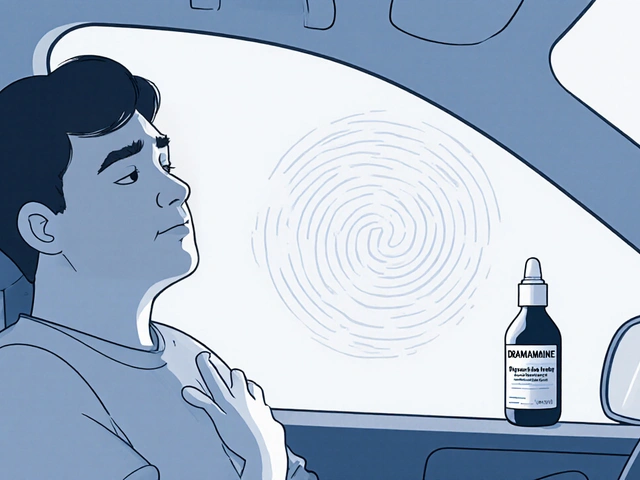
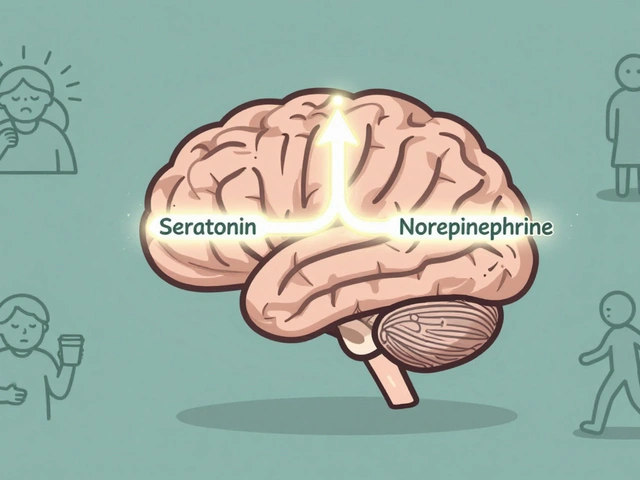
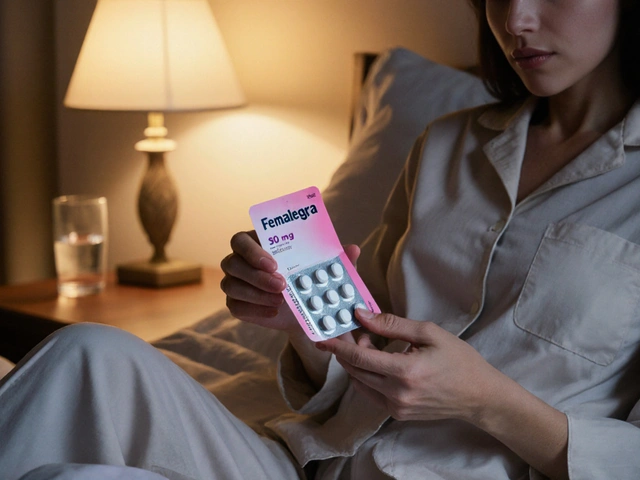
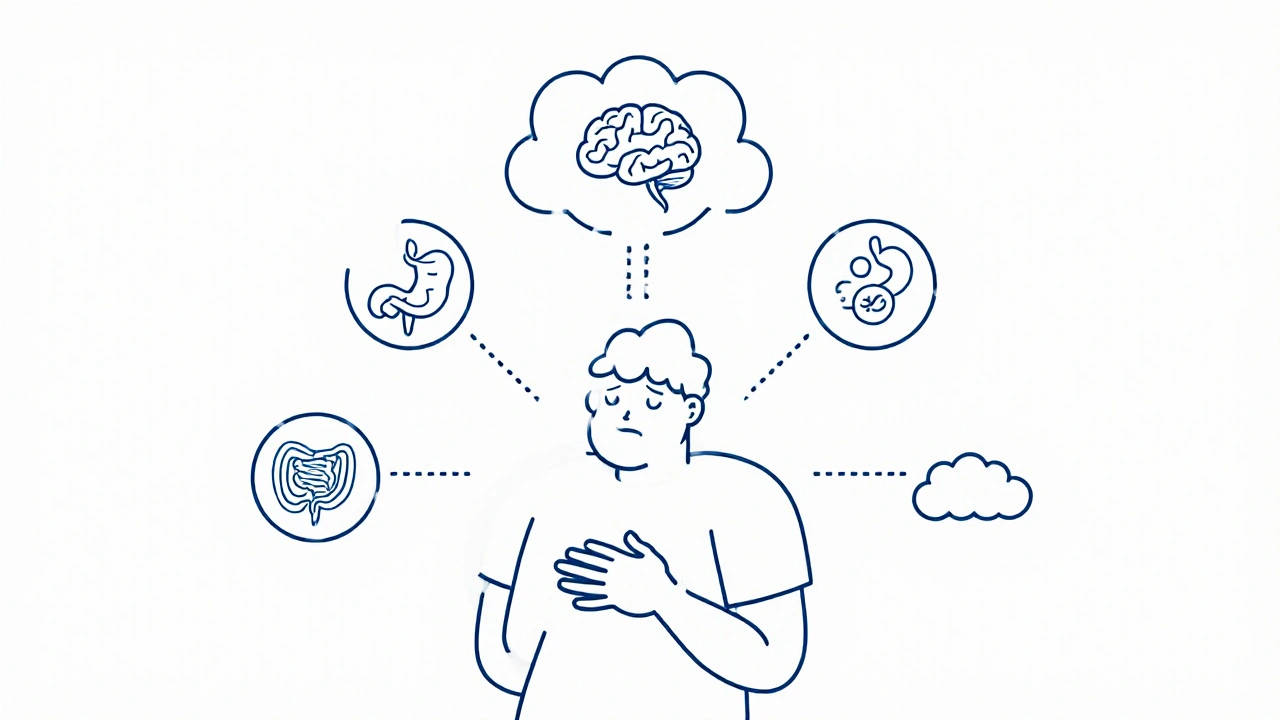
Comments
8 Comments
Erika Hunt
I’ve had IBS for over a decade, and honestly? The biggest shift wasn’t medication-it was realizing my brain and gut are in a constant, chaotic text thread. I used to think stress was just a side note, but once I started doing gut-directed hypnotherapy, my bloating dropped by like 70%. I know it sounds woo-woo, but if you’ve tried everything else… it’s worth a shot. I did 12 sessions. No magic, just science. And yes, I cried in session 3. It’s emotional work. But my life is different now. I can travel. I can eat at restaurants. I don’t plan my day around bathrooms anymore. It’s not cured-but it’s manageable. And that’s everything.
Sharley Agarwal
Low-FODMAP? Just eat less junk.
prasad gaude
In India, we used to say "gastric"-and everyone nodded like it was a spiritual condition. No tests. No labels. Just herbal teas and silence. But now, with all this science, I see it’s not about karma or bad food-it’s a wiring problem. The gut has its own mind, you know? Like a little philosopher living in your belly, whispering in nerves. And when the world screams too loud? It screams back. Maybe we didn’t need more pills. Maybe we needed to listen. Not fix. Not control. Just… listen.
Shirou Spade
Interesting how the medical system treats IBS like a puzzle with missing pieces-when really, it’s a symphony of signals gone off-key. We rush to label it, drug it, diet it-but we rarely sit with the fact that the body is trying to communicate. IBS isn’t broken. It’s overwhelmed. And the most powerful treatment? Not a pill. Not a diet. But the quiet act of saying: "I hear you." To your gut. To your stress. To your hormones. That’s where healing begins. Not in the lab. In the stillness.
Lisa Odence
OMG YES!!! 🙌 IBS is SO under-researched and so misunderstood!! I literally had a doctor tell me to "just relax" and then handed me a coupon for a yoga class 😭 The science here is SO accurate-especially about the gut-brain axis!! I’ve been on low-FODMAP for 8 months and it’s been life-changing!! I even tracked my cycle and now I know to avoid dairy + apples the week before my period!! Also, Bifidobacterium infantis 35624 is the ONLY probiotic that worked for me!! Everyone else is just selling hope!! 📊📚 Please, if you have IBS-DON’T GIVE UP!! You’re not crazy, you’re not lazy, you’re not "just stressed"-you have a real, measurable, neurological-gastrointestinal disorder!! 🌱❤️ #IBSawareness #gutbrainaxis #lowfodmaplifestyle
Jefriady Dahri
Been there. Done that. Wore the "I survived IBS" t-shirt. The thing nobody tells you? It’s not about finding the one trigger. It’s about finding your rhythm. Some days, you eat garlic and feel fine. Other days, a banana feels like a bomb. That’s the chaos. But once you stop fighting it and start observing it-like a scientist with your own body-you start to see patterns. I started journaling. Not just food. Mood. Sleep. Weather. Even my commute. Turns out, a 20-minute subway ride in rush hour was triggering more than my coffee. Weird? Maybe. True? Absolutely. You’re not broken. You’re adapting. And that’s strength.
Arup Kuri
Low FODMAP? That's just Big Pharma's way of selling specialty food. They don't want you to know the real cause: GMOs and fluoride in the water. IBS is your body rejecting poison. I stopped eating wheat and now I'm fine. Also, the government doesn't want you to heal because they profit from your sickness. You think they'd approve a natural cure? Nah. They need you on pills forever. Trust no one. Eat organic. Drink spring water. And never trust a doctor who says "it's all in your head"-they're part of the system.
Elise Lakey
Thank you for writing this. I’ve been too afraid to talk about it-until now. I didn’t realize so many others feel this way. I’ve been avoiding social events because I’m scared of accidents. I didn’t know hormones played a role. I’m going to track my cycle and try the low-FODMAP diet with a dietitian. I’m not alone. That’s the first time I’ve felt that in years.
Write a comment